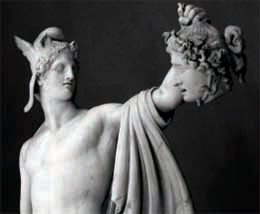- Home
- Archive -May 2010
- The father and . . .

The father and the son
- In :
- Personal Growth
May 2010
By Devdutt Pattanaik
Why the constant father-son conflict arises in Western mythology and how it is replaced with sacrifice in Hindu mythology
The conflict between father and son is best seen in Greek mythology. In the myth of creation, Cronus, the leader of the Titans, castrated his father Uranus, to rule over all of creation. This motif of father-against-son conflict was repeated when Cronus ate each of his children after birth to prevent them from usurping his power. Tricked by his wife Rhea, Cronus did not eat his son Zeus, who grew up, rebelled against his father and imprisoned him to rule in his place.
In the myth of the hero Perseus, his father Acrisius consults the Oracle because of his inability to bear a son. The Oracle prophesies that he will be killed by his daughter’s son, which causes him to imprison his daughter Danae. Zeus comes to her in the form of a golden shower and impregnates her, on hearing which Acrisius casts Danae and her son Perseus to sea in a wooden chest. Danae and Perseus are found and cared for by the fisherman Dictys. On growing up, Perseus unknowingly and unintentionally kills Acrisius in a sporting event.
 The mighty Zeus, king of the gods The mighty Zeus, king of the gods |
Laius and Jacosta, the king and queen of Thebes, consulted the Oracle when they were unable to conceive a son. The Oracle foresaw that if a son is born to them, he would kill Laius and marry Jacosta. In an attempt to prevent this prophecy’s fulfilment, when Jacosta indeed bore a son, Laius abandoned him on a nearby mountain. Years later, on having a doubt about his parentage, Oedipus consults the Oracle, who tells him the same fate she told Laius, without revealing the truth about his parents. In an attempt to avoid his fate he flees to Thebes. Along the way, Oedipus unknowingly kills his real father, Laius, in a dispute. On solving the riddle of the Sphinx and thereby securing the safety of the kingdom, Oedipus is made king of Thebes, and married to Jacosta, fulfilling the prophecy.
In Greek mythology, the repetition of the younger generation overthrowing the older generation is seen; which is rare in Hindu mythology. The older generation is insecure about their place and look suspiciously at the young ones, partly out of envy, partly out of fear. Psychologically speaking, the fear of Establishment seems to reflect in these myths. As soon as something has been established or made strong there will be those who fear it and work toward rebellion. Each generation is overpowered by its successors, the child wins over the father, and the young inherit the earth. In Hindu mythology, however, a different recurring theme is seen. Here, it is the father who triumphs and the son loses. And the defeat of the son, often voluntary, is glorified.
Yayati was cursed to become old and impotent. To stay young, he begged his sons to suffer the curse on his behalf. The eldest son, Yadu, refused. He believed that the father should respect the march of time. The youngest son agreed and suffered old age while his father enjoyed youth. Years later, having had his fill of youth, Yayati took back the curse of old age from his son. He then made a decision: the younger Puru would be his heir, not the elder disobedient Yadu. What Yayati celebrates here is sacrifice; Puru’s selflessness in putting his father’s pleasure ahead of his own earns him not only his father’s wealth but gratitude. Because of his willingness to allow his father to play out his unreasonable request, Yayati was given an opportunity to vent his vasana and return voluntarily to old age.
 Zeus’s son, Perseus, with the head of the slain Gorgon, Medusa Zeus’s son, Perseus, with the head of the slain Gorgon, Medusa |
Two approaches to succession. One in which succession is forcibly extracted. The other in which succession is voluntarily renounced. Interestingly, in the second place, the succession eventually comes to the renunciate.
When we are faced with a similar situation in our lives, it helps to remember that sacrifice and selflessness are life affirmative. However, they remain so only if they come from the heart and are not motivated by a desire to gain.
As told to Sharukh Vazifdar
Devdutt Pattanaik has transformed his passion for mythology into a career, constructing the work culture of the Future Group. www.devdutt.com
To read more such articles on personal growth, inspirations and positivity, subscribe to our digital magazine at subscribe here
Life Positive follows a stringent review publishing mechanism. Every review received undergoes -
- 1. A mobile number and email ID verification check
- 2. Analysis by our seeker happiness team to double check for authenticity
- 3. Cross-checking, if required, by speaking to the seeker posting the review
Only after we're satisfied about the authenticity of a review is it allowed to go live on our website
Our award winning customer care team is available from 9 a.m to 9 p.m everyday
The Life Positive seal of trust implies:-
-
Standards guarantee:
All our healers and therapists undergo training and/or certification from authorized bodies before becoming professionals. They have a minimum professional experience of one year
-
Genuineness guarantee:
All our healers and therapists are genuinely passionate about doing service. They do their very best to help seekers (patients) live better lives.
-
Payment security:
All payments made to our healers are secure up to the point wherein if any session is paid for, it will be honoured dutifully and delivered promptly
-
Anonymity guarantee:
Every seekers (patients) details will always remain 100% confidential and will never be disclosed
